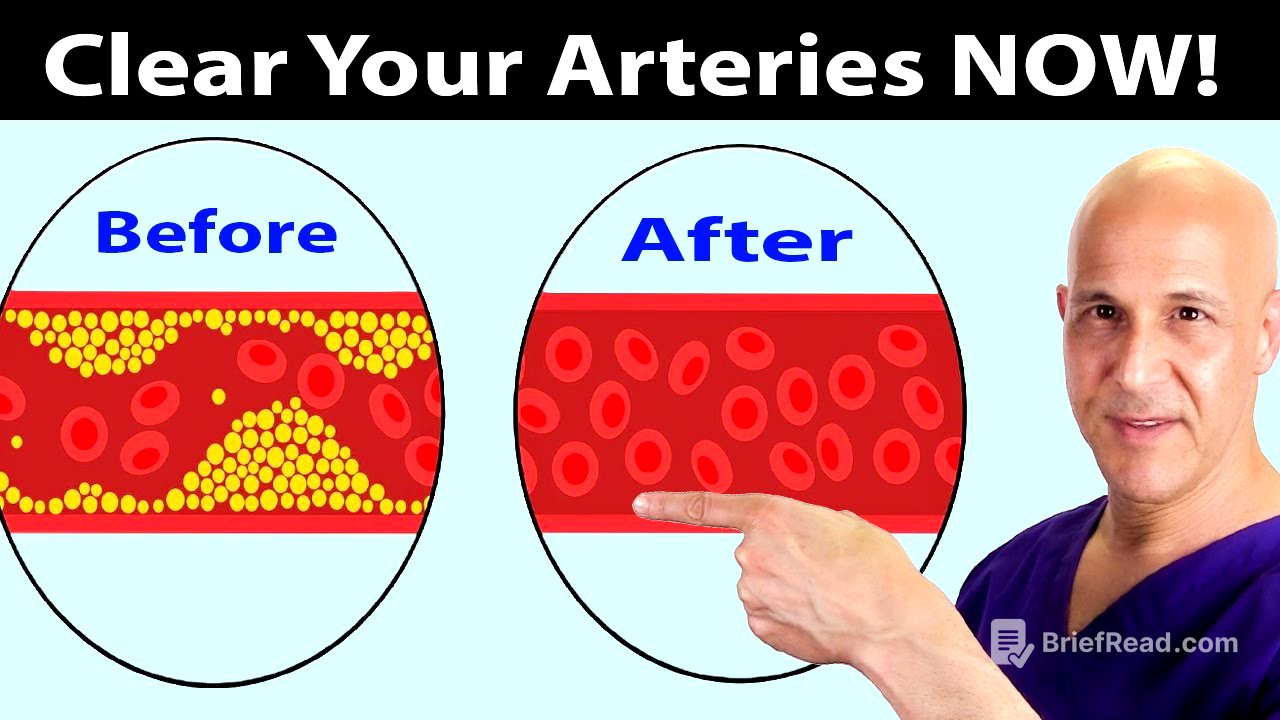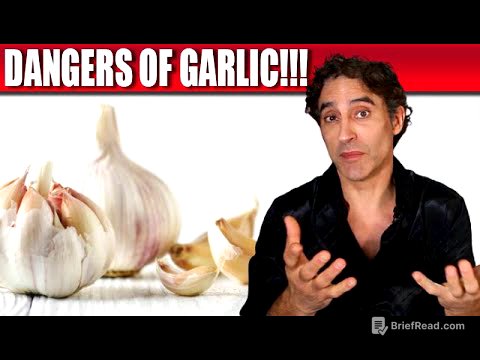TLDR;
This video by Motivationaldoc discusses foods that promote heart health by opening and unclogging arteries, improving blood circulation, and reducing the risk of cardiovascular diseases. It emphasises the importance of incorporating specific foods into your diet to maintain a healthy cardiovascular system. Key recommendations include fatty fish, nuts, turmeric, green tea, watermelon, spinach, avocado, olive oil, asparagus, pomegranates, cayenne pepper, berries, and garlic. The video also highlights the significance of exercise, hydration, adequate sleep, and a positive mental attitude for overall well-being.
- Eating fatty fish, nuts, and certain spices like turmeric can significantly improve heart health.
- Incorporating foods rich in antioxidants and nitric oxide helps in reducing arterial plaque and improving blood flow.
- Maintaining a balanced diet, regular exercise, and a positive mindset are crucial for preventing cardiovascular issues.
Introduction [0:01]
Dr. Mandel introduces a video focused on improving heart and cardiovascular health. The video aims to provide information on foods that can help open and unclog arteries, thereby improving blood circulation throughout the body. The goal is to help viewers and their families make significant changes to maintain a healthy heart.
Fatty Fish and Heart Health [0:30]
Eating fatty fish like salmon, mackerel, herring, sardines, or tuna at least twice a week can help prevent heart disease and heart attacks. The omega-3 fatty acids in these fish reduce bad fat in the blood, lower high triglyceride levels, reduce arterial plaque buildup, and lower high blood pressure.
Nuts and Blood Vessel Function [0:53]
Nuts are beneficial for heart and blood vessels due to their monounsaturated fats, which lower total and bad cholesterol (LDLs). They are rich in arginine, an amino acid that produces nitric oxide, which relaxes constricted blood vessels and improves blood flow, easing the strain on the heart and ensuring better blood supply to body cells.
Turmeric's Anti-Inflammatory Properties [1:34]
Turmeric is a powerful anti-inflammatory agent because of curcumin, which reduces arterial inflammation and can decrease plaquing within blood vessels by up to 26%. Curcumin's potent antioxidants neutralize free radicals, preventing cellular damage and boosting the body's antioxidant enzyme production. Turmeric also reduces oxidative stress on vascular tissues, lowering the risk of chronic diseases.
Green Tea and Plaque Reduction [2:09]
Green tea is a potent antioxidant, containing epigallocatechin gallate, which helps break up plaques linked to dangerous blockages that can lead to heart attack and stroke. It prevents atherosclerosis, the buildup of plaque in arteries, and boosts metabolism, aiding in weight management.
Watermelon and Nitric Oxide Production [2:40]
Watermelon contains L-citrulline, which boosts nitric oxide production, helping arteries relax and function better, thus improving blood flow throughout the body. This significantly lowers the risk of heart disease.
Spinach and Arterial Health [2:56]
Spinach is rich in potassium and fiber, which help lower blood pressure and prevent arteries from getting blocked. The fiber in spinach also lowers bad cholesterol levels. Lutein in spinach helps cut inflammation, preventing clogging of arteries.
Avocado and Cardiovascular Benefits [3:23]
Avocado is filled with monounsaturated fatty acids, which are excellent for the cardiovascular system. Studies show that avocados lower bad LDL cholesterol and raise good HDL cholesterol. They also help sustain normal, healthy glucose and insulin levels and are high in antioxidants like lutein and zeaxanthin, important for eye health.
Olive Oil and Heart Attack Prevention [4:00]
Cold-pressed extra virgin olive oil can do wonders for the heart and blood vessels. It increases healthy fats, promoting satiety and preventing overeating. Studies show that olive oil can reduce the risk of heart attacks by up to 41%. The polyphenols in olive oil slow down the progression of atherosclerosis.
Asparagus and Cholesterol Control [4:50]
Asparagus helps combat elevated cholesterol, preventing the stopping up of veins and blood vessel inflammation. It can also help remove clots already present in the arteries due to its high fiber and mineral content, which prevent cardiovascular illness.
Pomegranates and Artery Protection [5:09]
Pomegranates contain phytochemicals that act as antioxidants, protecting the lining of the arteries against damage. They stimulate the body's production of nitric oxide, which helps keep blood flowing and arteries open. Studies suggest pomegranates can prevent arteries from becoming stiff and thick and may slow down plaque growth and cholesterol buildup.
Cayenne Pepper and Blood Vessel Strength [5:44]
Cayenne pepper, or chili pepper, contains capsaicin, which increases circulation, improves blood vessel strength, and reduces plaque buildup in arteries. Capsaicin helps dampen inflammation, which leads to plaquing of the arteries. Cayenne is also effective for treating cold and flu symptoms by breaking up mucus congestion.
Berries and Cholesterol Reduction [6:18]
Berries like raspberries, strawberries, blueberries, and blackberries are loaded with fiber, low on the glycemic index, and packed with antioxidants. They lower bad cholesterol and triglycerides. These berries are rich in anthocyanins, which lower blood pressure and make blood vessels more elastic. They also reduce inflammation by lowering inflammatory chemicals in the blood.
Garlic and Blood Circulation [6:59]
Garlic is rich in antioxidants like vitamin C and E, which remove free radicals that can damage healthy cells. It reduces bad LDL cholesterol, widens blood vessels, improves blood circulation, and prevents hardening of the arteries.
Lifestyle Recommendations [7:35]
A healthy body starts in the kitchen by cutting out excessive sugars, which are inflammatory and turn into fat and triglycerides, leading to arterial clogging. Exercise is important, along with drinking lots of water and getting enough sleep. Eating sugars in their whole state with fiber is key to lowering insulin resistance and sustaining normal insulin levels. Getting enough sleep, exercising, staying hydrated, and maintaining a positive mental attitude are crucial for overall health.









